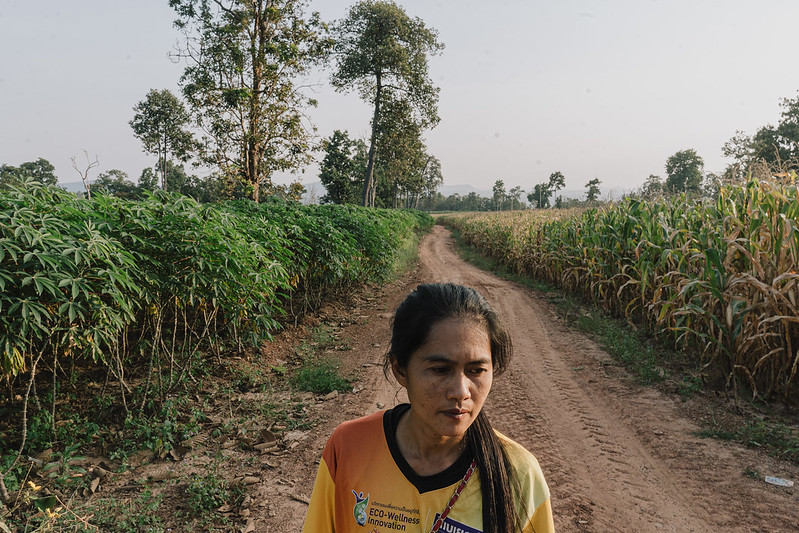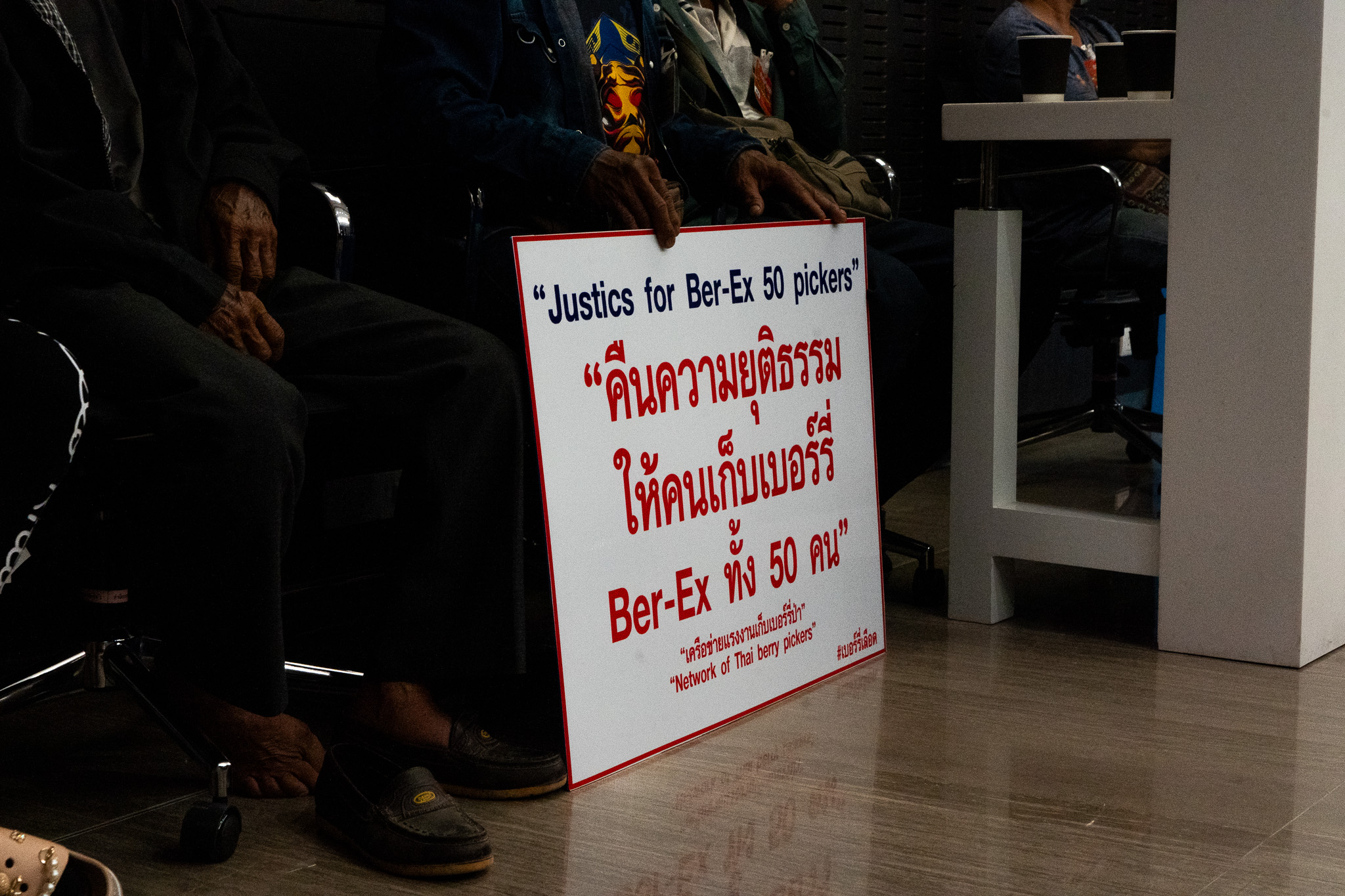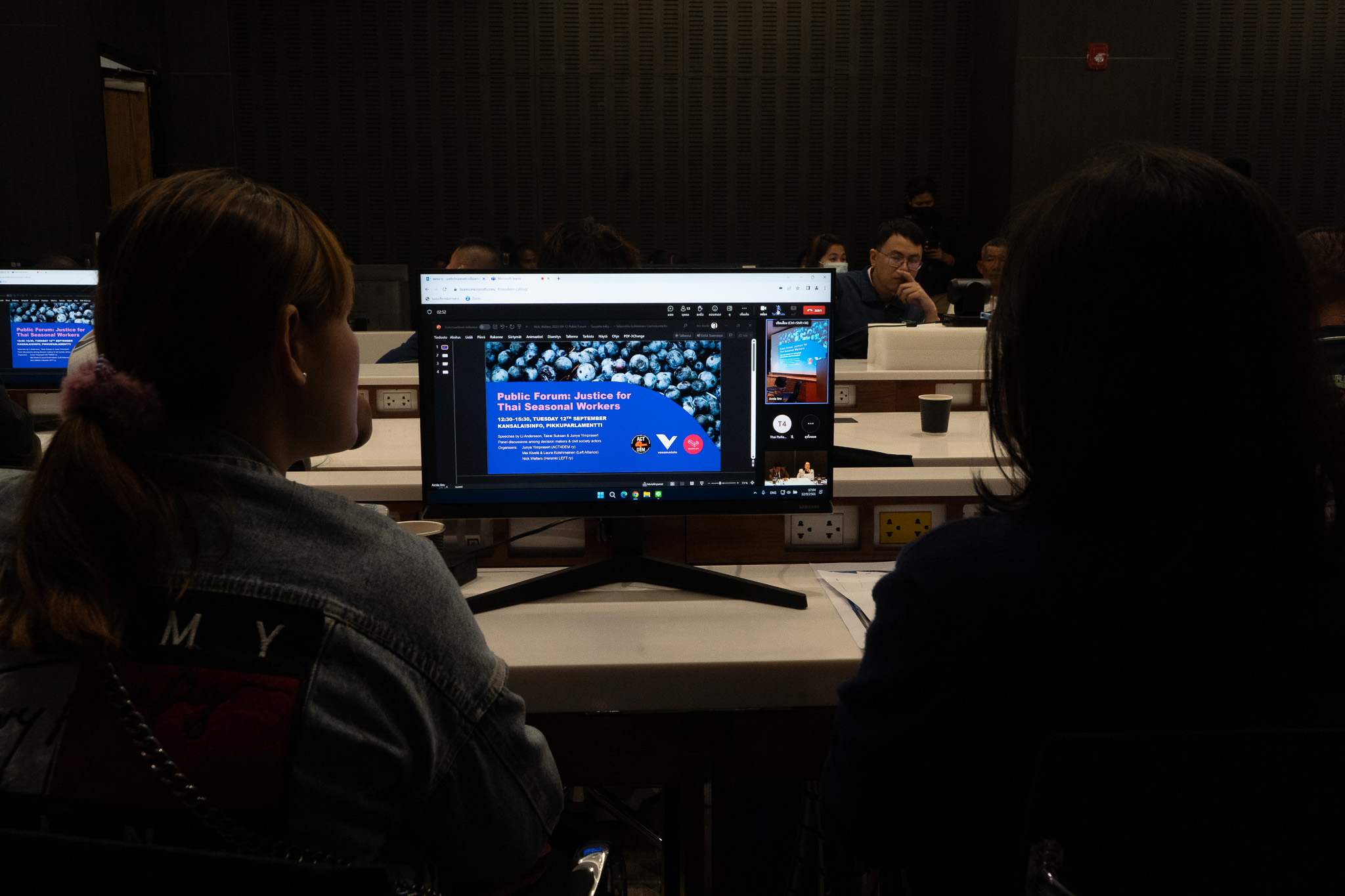NOTE: Two persons covered in the original version of this story have said that depictions of their words were exaggerated and misleading. Upon hearing their complaint, The Isaan Record removed any reference to said individuals. Our sincerest apologies for any inconvenience the original story may have caused them.
Guest Contribution by Ellen Krebs, Hideo Ishii-Adajar, Alexis Martin, Bina Aaron, Cameron Todd, Rita Trick, Priya Vaikuntapathi
On March 9, 2019, the Palang Pracharat Party held a rally, drawing a crowd as large as 30,000 from all over Khon Kaen Province. Held just outside Khon Kaen City at Phutthamonthon, the audience came to hear about the party’s policies in the run up to the March 24 election. Party bigwigs joined provincial candidates from ten constituencies, each speaking before an energized crowd.
The Palang Pracharat has an uphill battle here in the Northeast. In a Feb. 13 poll, 44.8% of northeastern voters were likely to vote for the Pheu Thai Party, followed by 21.2% for Future Forward, and the now defunct Thai Raksa Chat at 7.5%. Palang Pracharat came in with 7.4%, Bhumjaithai at 6.1%, and Democrat at 3.9%. With only 9% of Isaan voters undecided, there aren’t many hearts for parties like Palang Pracharat to win over.
Organizers had prepared 30,000 chairs arranged in the colors of the national flag. On each chair was a bottle of water, and a party flag. Flyers were handed out, listing the party’s key policies: Raising the stipend of Public Health Volunteers to 1,000 a month, raising the stipend for the elderly from 600 to 1,000 a month, providing 3,000 a month for pregnant women, and providing 10,000 baht for giving birth. For farmers, the party has pledged to provide 1,500 baht for pre-planting and 2,000 for harvesting for each rai of land up to 25 rai. Palang Pracharat also promises a three-year agricultural debt moratorium and to put more money into the village funds. (Photo by Priya Vaikuntapathi)
People were dropped off by buses, trucks, and cars and poured into the rally area. One participant interviewed said vans were arranged–10 passsengers and one driver–to get people to the rally. A staff member at the rally said that a driver told him that he was paid for getting villagers to the event and taking them back. (Photo by: Hideo Ishii-Adajar)
“Nobody asked us to come,” says Pranom Phurato (left), a 50-year-old food vendor from Khon Kaen’s Sam Sung District, when asked about her reasons to join the rally. She, like many others there, came to learn more about the party. For her, the biggest issue facing Thailand today is the low agriculture prices, and the slow economy over the last five years. (Photo by: Cameron Todd)
Wattana Changlao, 38, is a candidate for the Palang Pratcharat Party in Khon Kaen’s Constituency 2. As the rally is in his constituency, he makes sure he mingles with the voters before the event. He previously served as the Deputy Chief Executive of the Khon Kaen Provincial Administrative Organization, so he says he has a good idea of what issues people in his area are facing. He stresses that Palang Pracharat is a new party and not the military government party. But whatever policies the military government has implemented, the party would continue. (Photo by Priya Vaikuntapathi)
Many people at the rally were carrying the same sign: “Isaan People Love Uncle Tu,” referring to the nickname of current prime minister General Prayuth Chan-ocha who is also the head of the National Council for Peace and Order, the military group that overthrew the democratically elected government in 2014. The Palang Pracharat Party was initiated by those close to the military to allow them to transition from coup-makers to politicians. Mr. Prayuth is the only nominee for the Palang Pracharat Party’s choice of prime minister. (Photos by Priya Vaikuntapathi)
Kea Thongloe (middle) is a cheerful 74-year-old retired rice farmer from Phra Yuen District. She traveled 40 km to attend the rally, with transportation organized by her local candidate’s team. She says all 300 families from her village are attending the rally. She’s here to listen to the speech of her local candidate who has been the mayor of her town for 20 years. In that time, she says he has helped villagers in distress, for example, in getting water to upper-level agricultural areas. “[General] Prayuth is a good man. I like how he helps the poor,” she says about the prime minister. But she has not been happy with the rice prices over the last five years. “[He] can’t help everybody,” she adds. Her village has had a Democrat Party MP before, but she never saw that the party made anything better. (Photo by: Cameron Todd)
A group of men, from Khon Kaen constituencies 2 and 10, said they were paid 200 baht to come to the rally. “If they invite us, we will go!” they say, laughing. The only Palang Pracharat policy that any of them can recall is the welfare card, which provides 200-300 baht a month for the poor. They believe that the country’s biggest problem is the economy. (Photo by: Cameron Todd)
Chalarnpom Jotnak (right) , a 17-year-old and thus too young to vote, came with his parents to hear the policies of the party, although he doesn’t follow political news. When asked about the biggest problem in Thailand, he says “Bangkok is our biggest problem; it’s a chaotic place.” (Photo by Priya Vaikuntapathi)
Speakers from the stage warm up the crowd for the arrival of the party leaders. From those interviewed, it seems that the rally is less a gathering of party enthusiasts but more of an informational session with lots of dancing and cheering. (Photo by Priya Vaikuntapathi)
As the image of the party leaders come up on the screen to triumphant music, the crowd dances and sings along. (Photo by Priya Vaikuntapathi)
Sontirat Sontijirawong, Secretary of the Palang Pracharat Party and former minister of commerce under Prayuth, makes his way through the crowd. As the highest member of the party at the rally, his presence excites the audience and he is rewarded with flower garlands. (Photo by Priya Vaikuntapathi)
The crowd is being coached by a speaker on stage: “When I say ‘The government,’ you say, ‘Palang Pracharat!’’ Triumphant music blasts from the speakers. Several video drones fly overhead in the dying light. (Photo by Priya Vaikuntapathi)
The candidates are mobbed at every step before finally making it up to the stage. (Photos by Priya Vaikuntapathi)
The candidates come on stage. (Photos by Priya Vaikuntapathi)
First-time MP candidate Wattana steps out for an interview with the press. He says the party’s political platform is based on social welfare policies which will be financed by the infrastructure budget. The party wants to focus on policies for the poor. When asked whether the Pheu Thai Party already had claim to be the party of the poor, Mr. Wattana said that through “using the power of our own hearts,” his party will do even more for the poor. Palang Pracharat Party is the most poor-oriented party in Thailand, he argues. “We will win the hearts of the people here,” he says. “I am confident we will win.” (Photo by Priya Vaikuntapathi)
Each candidate gives a speech, but the climax of the event is over. The audience begins to leave to their buses, trucks, and cars, ready to go back home. (Photo by Priya Vaikuntapathi)
The rally rather abruptly ends in darkness. It is late and people want to go home for dinner. Lines of air-conditioned buses pull out of the back parking lot. Trucks with the elderly and young sitting in the back start to make their way home. The traffic barely moves. People in the back of trucks asked what they thought of the event answer that they are ready to vote for the Palang Pracharat Party.
Ellen Krebs studies sociology at the University of Wisconsin-Madison. Cameron Todd studies political science at George Washington University. Rita Trick studies environmental engineering at the University of Colorado Boulder. Bina Aaron studies Neuroscience at Amherst College. Hideo Ishii-Adajar studies mathematics and economics at the Southern Methodist University. Alexis Martin studies public health and dance at Tulane University. Priya Vaikuntapathi studies global studies at the University of Illinois at Champaign-Urbana.
All are learning about development issues and globalization in Khon Kaen this spring term.






















